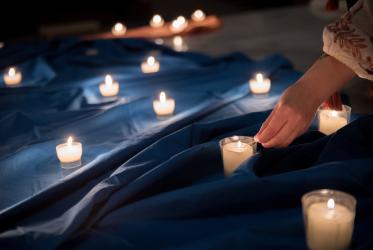“The guns have to go silent, so that people have the time to reflect, heal and move forward toward a path of peace,” said Fr James Oyet Latansio, general secretary of the South Sudan Council of Churches (SSCC).
Oyet Latansio was speaking about the recently signed “Compromise Agreement on the Resolution of the Conflict in the Republic of South Sudan” and the impact of violence on people in his country in an event hosted by the World Council of Churches (WCC) on 9 September at the Ecumenical Centre in Geneva, Switzerland.
Oyet Latansio reported that there remains a great amount of mistrust among parties that needs to be eliminated. “Churches in South Sudan consider the compromise peace agreement a road map for peace, and a step forward. Yet to make peace a reality, on many levels, from political leaders to the common people, trust needs to be built.”
The proposed peace agreement was presented by the Intergovernmental Authority on Development (IGAD) in mid-July and urges an end to the on-going conflict in the country.
In a recent statement issued by the (SSCC), the church leaders said, “We have consistently called for an immediate and unconditional end to the fighting. The war must stop immediately. There is no moral justification for this senseless war. It is unacceptable that people continue to kill and be killed while leaders argue over power, positions and percentages.”
Affirming this vision, Oyet Latansio said that as a pastor he feels a great responsibility to proclaim “the word of God to the Christians, who have taken up arms against each other.”
“We must make sure that those who profit from wars are held accountable,” he added.
The Church in South Sudan has provided a “neutral space” to people, where they can feel safe and share the pains they have suffered due to the conflict in the country, said Oyet Latansio. “This support is for everyone, including people who may be victims or perpetrators.”
Oyet Latansio explained that, by offering such forums, churches have helped initiate a dialogue, in which people can communicate, forgive, heal from the trauma and reconcile.
He went on to say that despite different linguistic or tribal identities, it is extremely important for the people of the country to embrace their shared South Sudanese identity. Oyet Latansio said that it is only through unity that South Sudanese can march together toward justice and peace.
The SSCC general secretary expressed appreciation for the support he said South Sudanese churches have received from ecumenical organizations, including the WCC, the ACT Alliance, the Lutheran World Federation, Caritas and other international ecumenical partners. “It is through our common efforts, support to each other and collaboration that we can make peace a reality,” he said.
South Sudanese church leaders urge an end to conflict in their country (WCC news release of 10 August 2015)



